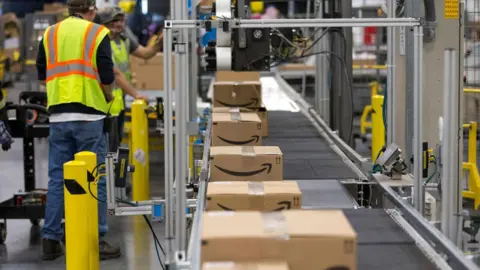The White House has taken a robust stance against Amazon’s reported intentions to inform its customers about the price implications of President Donald Trump’s trade tariffs. The organization’s press secretary, Karoline Leavitt, characterized this plan as a “hostile” political maneuver. Leavitt stated she recently discussed Amazon’s actions with President Trump, asserting that the situation serves as a compelling reason for Americans to favor domestic products over imports. This exchange highlights the increasingly tense atmosphere surrounding trade tariffs and their impact on pricing for consumers across the nation.
Amazon has yet to confirm its purported strategy of breaking down tariff costs for American consumers. This lack of clarity from the retail giant raises questions about the validity of the claims and underscores the broader debate regarding the economic effects of Trump’s import taxes. Opposition to these tariffs is mounting, with economists warning that they will likely drive up prices for everyday goods and contribute to the possibility of a recession. The gravity of this situation reflects the growing challenges faced by the Trump administration as it navigates its trade policy amidst increasing scrutiny.
During a press conference marking the president’s 100 days in office, Treasury Secretary Scott Bessent defended the government’s economic performance, promising ongoing trade discussions with major international partners. However, he sidestepped inquiries regarding potential negotiations with China, which was the third-largest supplier of imports to the United States after the European Union and Mexico in the preceding year. This evasiveness suggests the complex and precarious nature of US-China trade relationships, especially amid heightened tensions surrounding tariffs.
Since his return to office in January, President Trump has escalated tariff measures, insisting that they will bolster manufacturing within the US and enhance tax revenues. Even though he has recently tempered some of his initial proposals, his new measures impose tariffs of at least 10% on many foreign imports, with products originating from China facing staggering tariffs of at least 145%. Such drastic increases have resulted in a sharp decline in trade between the US and China, stirring concerns over potential supply chain disruptions and product shortages across numerous sectors, from essential baby products to common household items like umbrellas, for which China is a leading supplier.
The dynamics between President Trump and Amazon’s founder, Jeff Bezos, have been noteworthy as well. After the elections, Bezos met with Trump and commended the administration’s push for deregulation and favorable tax reforms. Amazon, a key player in the e-commerce landscape, was among numerous businesses that financially supported Trump during his inauguration, with Bezos being granted a prominent seat at the event.
Reports about Amazon’s plan to disclose the pricing ramifications of tariffs originated from Punchbowl News, which cited an unnamed informant. As Amazon has not commented on these claims, the situation remains fluid and uncertain. Press Secretary Leavitt refrained from delving into the existing relationship between Trump and Bezos but referenced her conversations with the president about the unsettling developments.
Leavitt articulated her concerns in a blunt statement, labeling Amazon’s proposed actions as “hostile and political,” questioning why the company did not take similar actions when the Biden administration faced inflation rates soaring to a 40-year high. This comment underscores the political undercurrents influencing corporate communications and public perception in the current environment.
As inflationary pressures grow, various companies, including online platforms like Shein and Temu, have begun to announce price increases to reflect the financial impacts of tariff measures. Significant analysis indicates that sellers from China account for about half of all merchants on Amazon’s US platform, amplifying the potential reverberations of these tariffs across the retail sector.
In summary, the escalating tension between the White House and Amazon over tariff-related pricing strategies encapsulates a larger narrative about trade, politics, and economic policy within the United States. As businesses adjust to these policies and the consumer landscape shifts, the implications for national and global markets continue to unfold.



